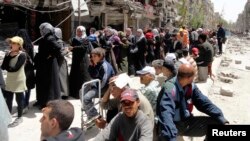Three years of conflict in Syria have taken an enormous toll on the population inside the country and beyond its borders. More than 162,000 people have been killed. Of the country’s estimated pre-war population of approximately 20 million people, 9.3 million are in need of aid, with some 4 million lacking even basic necessities such as food.
More than six million are internally displaced, refugees within their own country; while an additional more than 2.8 million have left for neighboring countries, with many living in host communities and camps.
Of Syria’s neighbors, Lebanon has been the most deeply impacted by the influx of refugees fleeing the violence, with over 1.1 million registered refugees from Syria. And that is one reason why Secretary of State John Kerry took the opportunity to announce during a June 4 visit to Lebanon, an additional $290 million in humanitarian assistance for the Syria response, which will help people inside Syria and also the countries that host refugees who have fled the violence. With this new assistance, the United States is now providing more than 2 billion dollars in response to this humanitarian crisis, said Secretary Kerry:
“There is still an enormous need on the ground that is not being met, and I’m not going to stand up here and pretend that the two billion or the money we’re giving today is enough. Also for those refugees, just being supported in a refugee camp is not enough. It doesn’t change their lives, it doesn’t end the war, it doesn’t speak to their day-to-day sense of loss and abandonment, and it certainly doesn’t provide them with the long-term security and opportunity that they deserve.”
“All of us, all nations, have a responsibility to try to end this conflict,” said Secretary Kerry, calling particularly on those nations directly supporting the Assad regime, to work with the international community and bring the Syria conflict to an end.
He also called on international donors to deliver to the Syrian people aid that they had pledged. It is critically important now, he said, to support Lebanon, and to support others in the region who are suffering the consequences of this humanitarian crisis.
“I am very proud,” said Secretary Kerry, “that the United States of America is leading the charge and responding to this moral and this security imperative.”
More than six million are internally displaced, refugees within their own country; while an additional more than 2.8 million have left for neighboring countries, with many living in host communities and camps.
Of Syria’s neighbors, Lebanon has been the most deeply impacted by the influx of refugees fleeing the violence, with over 1.1 million registered refugees from Syria. And that is one reason why Secretary of State John Kerry took the opportunity to announce during a June 4 visit to Lebanon, an additional $290 million in humanitarian assistance for the Syria response, which will help people inside Syria and also the countries that host refugees who have fled the violence. With this new assistance, the United States is now providing more than 2 billion dollars in response to this humanitarian crisis, said Secretary Kerry:
“There is still an enormous need on the ground that is not being met, and I’m not going to stand up here and pretend that the two billion or the money we’re giving today is enough. Also for those refugees, just being supported in a refugee camp is not enough. It doesn’t change their lives, it doesn’t end the war, it doesn’t speak to their day-to-day sense of loss and abandonment, and it certainly doesn’t provide them with the long-term security and opportunity that they deserve.”
“All of us, all nations, have a responsibility to try to end this conflict,” said Secretary Kerry, calling particularly on those nations directly supporting the Assad regime, to work with the international community and bring the Syria conflict to an end.
He also called on international donors to deliver to the Syrian people aid that they had pledged. It is critically important now, he said, to support Lebanon, and to support others in the region who are suffering the consequences of this humanitarian crisis.
“I am very proud,” said Secretary Kerry, “that the United States of America is leading the charge and responding to this moral and this security imperative.”

















